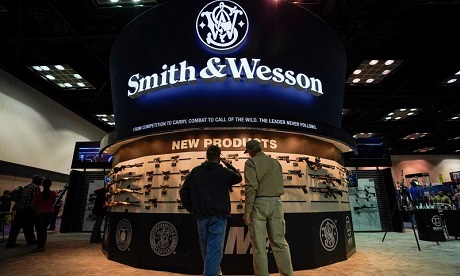Assault rifles, mass shootings and Catholic nuns aren’t usually linked – but in the US nuns are suing Smith & Wesson’s directors over its AR-15 assault rifle production.
Their aim is to try to force the firearms manufacturer to stop making, marketing and selling assault-style rifles many US killers use in mass shootings.
The nuns’ lawsuit alleges the directors have ignored growing legal risks from making assault-style rifles.
The directors have been able to get away with this because gunmakers have been protected. A 2005 US law known as The Protection of Lawful Commerce in Arms Act protected them from being held liable for mass shootings.
That changed last year.
Rival gunmaker Remington agreed to pay US$73 million to settle claims relating to a mass shooting at an elementary school.
Encouraged by the elementary school families’ success, others are now looking to sue weapons’ manufacturers over mass shootings.
The lawsuit
The nuns’ lawsuit against Smith & Wesson’s directors and senior management has exposed the company to significant liability, the New York Post reports.
The Post says Smith & Wesson could be seen to be intentionally violating federal, state and local laws and failing to respond to lawsuits over mass shootings.
It also says the first page of the Catholic nuns’ lawsuit contains a photo from a mass shooting in Colorado in 2012.
The image shows a Smith & Wesson assault rifle on the blood-splattered ground next to pink sandals. Twelve people died and 70 were injured in that single attack.
The nuns speak out
“These rifles have no purpose other than mass murder” say the nuns.
The group – comprising nuns from four different Catholic orders – filed their “derivative lawsuit” in their role as Smith & Wesson shareholders.
Their attorney says this lawsuit is the first derivate case against a board over assault rifles.
Derivative lawsuits seek to hold corporate boards liable for breaches of their duties to shareholders. Generally however, Courts find boards are protected from lawsuits for good-faith decisions.
If the nuns’ lawsuit succeeds, the company’s directors would be liable for any costs associated with allegedly marketing illegal assault rifles.
Any damages would be paid to Smith & Wesson, not the plaintiffs.
The company included a warning in its 2022 annual report that it might have to pay significant damages due to legal proceedings against it.
Assault rifles – legal here, illegal there
New York, Illinois and California are among the states that have legislation which either outlaws assault rifles or makes it easier to sue over their use.
The US Supreme Court and many other states however have taken steps to expand gun-owner rights.
Source
